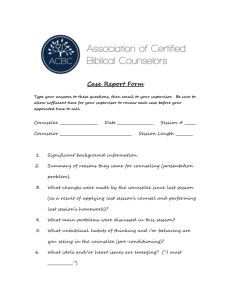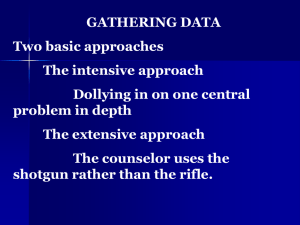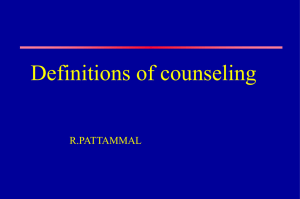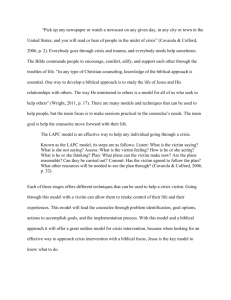NANC Biblical Counseling Class
advertisement
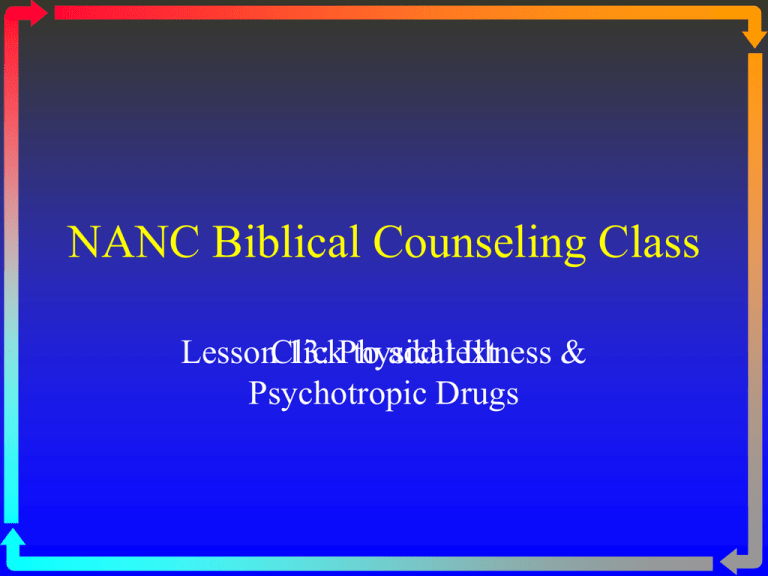
NANC Biblical Counseling Class LessonClick 13: Physical to add text Illness & Psychotropic Drugs XVIII. Physical Illness1 1 Adapted from material produced by NANC & Faith Biblical Counseling A. The Biblical Counselor’s Role 1. The biblical counselor’s role is to address the counselee’s response to physical illness 2. This does not require the counselor to possess medical knowledge in order to help the counselee 3. The counselor should rely on the counselee to provide any needed medical information A. The Biblical Counselor’s Role 4. Counselors, even if they possess medical background, should not play the role of a physician Accept the diagnosis. It is not the counselor’s role to prove or disprove the diagnosis b. Do not recommend other possible diagnoses, methods of diagnosis, or treatments a. 5. The counselor should help the counselee to deal with the illness from a spiritual perspective, not a medical perspective 6. The goal is to turn the counselee’s attention from the pain and discomfort of the illness to what God is doing through it B. Counseling Principles 1. Data gathering a. Information about the medical condition i. ii. iii. iv. v. How was a diagnosis made? Basic background about the condition Lifestyle changes because of the condition The effect of any medications The future of treatment / prognosis b. Information about the counselee’s response i. What is his thinking or attitude about the condition? ii. How have family and friends responded? iii. Where is God in the counselee’s life and thinking? B. Counseling Principles 2. Hope a. Help the counselee see that there can be contentment in God even if relief does not come b. Help the counselee to see what God is doing in them through the condition c. Be understanding and encouraging (Gal. 6:2) 3. Teach appropriate biblical principles a. Regarding trials & suffering (see previous lesson) b. Regarding sickness B. Counseling Principles 4. Homework a. Focus on application of biblical principles rather than health issues b. The area of focus in homework is helping the counselee to respond biblically to the challenges of the illness C. Biblical Principles2 1. Help counselees to think biblically about all aspects of their condition (2 Cor. 10:5, Phil. 4:8) 2. God will not allow the difficulties of the condition to exceed the person’s ability to handle it (1 Cor. 10:13) 3. The illness is under the control of a sovereign God (Prov. 21:1, 1 Chron. 29:12) 2 Adapted from Robert Smith, The Christian Counselor’s Medical Desk Reference, 57-61 C. Biblical Principles 4. Embrace God’s sufficient grace (2 Cor. 12:7-10, 9:8) 5. Cultivate thankful contentment (Phil. 4:11-13, Job 1:21, 1 Thes. 5:16-18) “Christian contentment is that sweet, inward, quiet, gracious frame of spirit, which freely submits to and delights in God’s wise and fatherly disposal in every condition” – Jeremiah Burroughs, The Rare Jewel of Christian Contentment. C. Biblical Principles 6. Pursue new opportunities for ministry (Phil. 1:12-18) 7. “Victory [biblically defined] is being controlled by biblical principles rather than the agony of the condition” (Phil. 3:7-10) D. Resources • Robert Smith, The Christian Counselor’s Medical Desk Reference (Timeless, 2000). XIX. Psychotropic Drugs3 3 Adapted from material by Stuart Scott, NANC, and Faith Biblical Counseling A. Are drugs needed in biblical counseling? 1. There is a difference between medicine & psychiatry regarding disease: a. Medicine i. There are behavior problems which truly have an organic cause ii. When an organic cause of this nature is found, it is given a medical disease diagnosis. Usually the name given reflects the cause, not the symptoms. iii. To qualify as an illness, the condition must show damage to bodily tissue A. Are drugs needed in biblical counseling? b. Psychiatry Diagnosis of syndromes or “disorders” are based on symptoms or behavior, not the cause ii. There is no general agreement on the cause for such symptoms or behavior i. MEDICINE: PSYCHIATRY: Disease Theory Symptoms Symptoms A. Are drugs needed in biblical counseling? 2. Why are drugs used? a. The “chemical imbalance” theory of psychological disorders teaches that the symptoms are a result of a chemical imbalance in the brain. b. Drugs are prescribed which supposedly fix the imbalance and thus cure the person A. Are drugs needed in biblical counseling? 3. Problems with the chemical imbalance view a. Brain physiology is still so poorly understood that no neurotransmitter imbalance or balance has ever been documented b. Even if brain chemical levels were able to be measured, one could not determine if the chemical levels caused the depression or if the depression changed the chemical levels c. The mechanism of many psychological drugs is unknown or inconclusive d. Furthermore, medications are not remotely close to 100% effective A. Are drugs needed in biblical counseling? e. Improvement of feelings as a result of a medication does not prove there was a chemical imbalance “Psychiatric medication is not treating a verifiable chemical imbalance in the brain. Contrary to public perception, psychiatric medications are not chemical bullets that target one particular brain chemical. They are more like chemical blitzkriegs, strafing chemical sites in the brain and hoping for the best. The brain is simply too complex and is sustained by too many chemicals for us to be able to pinpoint chemical imbalances with our current level of knowledge. The most we can reliably say is that psychiatric medication may minimize some symptoms, but it is not necessarily treating a chemical deficiency.” – Ed Welch, Blame it on the Brain, 109-110. A. Are drugs needed in biblical counseling? 4. The Bible emphasizes a person’s heart response as most important, not changing a person’s feelings. a. The Bible teaches that feelings are the result of beliefs, thinking, and actions (John 13:17, James 1:25, Prov. 29:18, Gen. 4:5-7) Beliefs, Thoughts, Desires Behavior Feelings Chemical Imbalance Circumstance Unbiblical response Bad feelings / emotions Bad feelings / emotions Good feelings / emotions Decreased function A. Are drugs needed in biblical counseling? b. Problems in life responded to in an unbiblical manner produce unpleasant feelings c. Feeling oriented people use their bad feelings as the reason for their inability to function d. Medication is used to reduce the bad feelings, making the person feel better and thus help him function better e. When a person feels better because of the improved feelings, this gives the false impression that the problems are solved f. Even though feelings can be improved through medication, the heart is not addressed A. Are drugs needed in biblical counseling? 5. Concluding that medication is needed for counseling success denies the sufficiency of Scripture (2 Pet. 1:3, 2 Tim. 3:16-17) 6. Bad feelings are often God’s warning system that something is wrong in the heart. Medication can mask that warning system so that heart issues are not addressed 7. When no proven medical issue exists, no medication is truly needed B. Counseling Guidelines 1. Data gathering a. Get lots of information on the circumstances surrounding the time in life when medications were started b. Discover how the counselee responded to those circumstances c. Ask X-ray questions to discover thinking, desires, and heart issues d. How have they responded since being on medication? B. Counseling Guidelines 2. Build the relationship and point to Christ and His Word as the source of true hope 3. Do not be critical of the counselee’s decision to begin medication 4. Teach the biblical view of problems and the presence of bad feelings B. Counseling Guidelines 5. Keep biblical goals in mind: a. The goal is not to get the person off medication b. The goal is to help the person to be more like Christ by responding biblically to the circumstances of life c. The goal is to help the person trust Christ more through the problems rather than to feel better 6. Eventually, the counselee will see that they do not need medication because they have learned to respond to problems biblically C. Coming off medications 1. If the counselee is already on medication a. The counselor’s job is not to take the counselee off medication b. The counselor’s job is to help the counselee to learn biblical solutions while still on medication 2. If the counselee asks to be taken off medication right away a. Learn his thinking and reasons for doing so b. Explain that there is much work to be done and that the question of coming off of medication will be discussed later C. Coming off medications 3. Don’t discuss coming off medication until the counselee is consistently responding biblically to problems 4. When the counselee reaches that point and wants to come off the medication, send him back to the doctor who started medication 5. If that doctor refuses, the counselee will need to get a second opinion 6. Continue counseling for 3-4 weeks after the counselee is completely off medication D. Resources • Ed Welch, Blame it on the Brain (P&R). • Ed Welch, Addictions: A Banquet in the Grave (P&R). • Robert Smith, The Christian Counselor’s Medical Desk Reference (Timeless).
